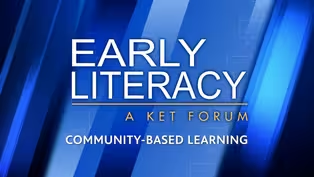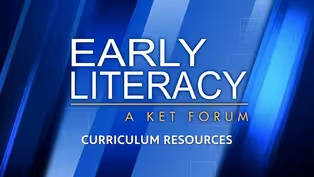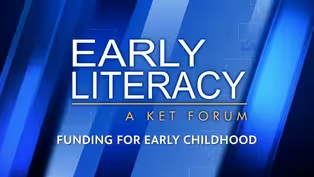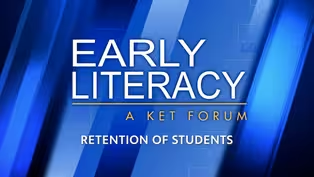KET Forums
At Home Instruction | Early Literacy: A KET Forum
Clip: Episode 25 | 4m 29sVideo has Closed Captions
The panel from Early Literacy: A KET Forum takes questions on at home instruction.
The panel from Early Literacy: A KET Forum takes questions on at home instruction.
Problems playing video? | Closed Captioning Feedback
Problems playing video? | Closed Captioning Feedback
KET Forums is a local public television program presented by KET
KET Forums
At Home Instruction | Early Literacy: A KET Forum
Clip: Episode 25 | 4m 29sVideo has Closed Captions
The panel from Early Literacy: A KET Forum takes questions on at home instruction.
Problems playing video? | Closed Captioning Feedback
How to Watch KET Forums
KET Forums is available to stream on pbs.org and the free PBS App, available on iPhone, Apple TV, Android TV, Android smartphones, Amazon Fire TV, Amazon Fire Tablet, Roku, Samsung Smart TV, and Vizio.
Providing Support for PBS.org
Learn Moreabout PBS online sponsorshipI mean, you can't make a parent, you know, be a part of that student's lives in a student's life.
But I will tell you that educators feel that responsibility.
I mean, we know that that is our responsibility to teach our students to be able to read.
And, of course, parents are very valuable, important stakeholders in that.
The resources that we've created and you mentioned it was the right at home plan and family guidance document and anybody not not just a parent but a grandparent and an uncle and older sibling could take that rated home plan and look at it and really help to bolster that student's reading abilities.
Small, easy, quick, accessible activities that they could do.
A lot of them are games, phone, roms, you know, things that could really help that student.
It doesn't necessarily have to be a parent of that child to utilize those kind of resources.
But again, to your point, you we do have a lot of parents who want to be a valuable partner to our schools.
They want help.
They just don't know how.
So we really tried to include in that reading at home, playing guidance how they you know, how the child learns to read the science behind the brain, learning to read to help our parents who do want to be involved know that information as well.
To that question, educators are being asked to do things you should never have you are trying to do.
You shouldn't have to do.
We have societal problems that we have to overcome.
And one piece of legislation is not going to solve all of our societal problems, but we do have a responsibility to continue to try.
This is a completely different program, but I think it's important to get books in the hands of children.
We have recently adopted the Dolly Parton appropriate money for the Dolly Parton Imagination Library, trying to get books in front of children who need to have that opportunity.
I will add one thing.
No, you go ahead.
I feel, though, that much of this is built upon relationships.
And so, you know, part of what is woven into the bill is the the establishment of that parent as a team member, as an advocate for that reading improvement plan for their child.
And so I think the more the school can engage with parents can can make the attempt to reach out to parents, the more likely they will be to see them as a partner and as as in have a willingness to join along with the teachers at the school to work toward that student success.
And we partnered with the Kentucky Collaborative for Families in Schools.
And so we have an administrator and educator facing document that talks about two way communications and relationship building.
And then we have the more extensive document that will actually be able to be given to parents and families for the work that they can do at home.
I was just going to say a lot of it has to do with teaching the parents, also the changes.
And as a teacher, when they weren't homework, they weren't spelling words, They went site word list.
They went to see their spelling test when they get home and see what words they've learned.
And so a lot of it is just communicating with families about the changes and they want to help their kid that they really do.
The majority of the students in your class, like their parents, really want to help them.
It's just really educating the parents on the change.
And from my experience this past year, they were on board.
They you know, they got used to it.
And it's just teaching them to like, what are we doing different?
Because they only know how to help their kid by how they were taught.
And so they learn.
They memorize spelling where it's they did a reading log in, you know, they would bring home their spelling test.
So it's just kind of teaching them ways that they can help their kid at home.
Right.
Does that fall, though, on the teacher?
Does it fall on the school?
Does it fall on the district?
Who?
How does that I mean, all together.
Right.
Yeah.
Yeah.
To reach out and be a part of that.
Community-Based Learning | Early Literacy: A KET Forum
Video has Closed Captions
Clip: Ep25 | 2m 2s | The panel from Early Literacy: A KET Forum takes questions on community-based learning. (2m 2s)
Curriculum Resources | Early Literacy: A KET Forum
Video has Closed Captions
Clip: Ep25 | 4m 36s | The panel from Early Literacy: A KET Forum takes questions on curriculum resources. (4m 36s)
Funding for Early Childhood | Early Literacy: A KET Forum
Video has Closed Captions
Clip: Ep25 | 3m 26s | The panel from Early Literacy: A KET Forum takes questions on funding for early childhood. (3m 26s)
Retention of Students | Early Literacy: A KET Forum
Video has Closed Captions
Clip: Ep25 | 3m 33s | The panel from Early Literacy: A KET Forum takes questions on retention of students. (3m 33s)
Providing Support for PBS.org
Learn Moreabout PBS online sponsorship
- News and Public Affairs

Top journalists deliver compelling original analysis of the hour's headlines.

- News and Public Affairs

FRONTLINE is investigative journalism that questions, explains and changes our world.












Support for PBS provided by:
KET Forums is a local public television program presented by KET



